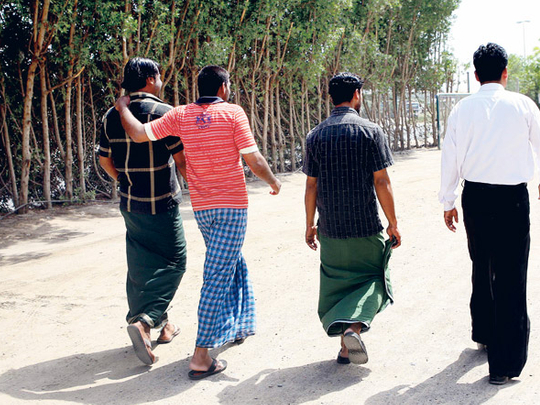
Sharjah: Sharjah Police are cracking down on men wearing the lungi, a wraparound dress worn across some South Asian countries, in public.
An Asian man was arrested and interrogated by police patrols in Sharjah a few days ago for wearing a lungi in public.
The man said police told him lungis cannot be worn in public.
He told Gulf News he had recently been stopped by CID officers who sought to know why he was going out in public wearing a lungi. "A few days ago I had an issue with police for leaving my home wearing a lungi," he said.
The man said he had gone out wearing a lungi that had its two ends stitched together when he was stopped at a petrol station's convenience store.
"I was caught by a police at the petrol station mart. Police asked me why I had ventured out wearing a lungi and a T-shirt," he said. He said he was warned not to go out dressed in that manner since there was a law that prohibited the attire.
"My lungi covered me right up to the toe. It was fully stitched and decent and clean," said the man.
The Indian man said the lungi is considered a traditional dress in his home country and is very commonly worn.
"I want to know if there is any law of this kind," he said.
Ambiguity in rules
"Why is it that people are not allowed to wear clothes they are used to if they are not revealing," he said.
"My lungi fully covered my legs. Why did the police have to arrest me while you see so many people wearing revealing dresses in public whom no one stops," he said, adding that it called for clarifying the decency law.
"Can anyone state the law for the public so that we can avoid being stopped by the police," he said.
Sharjah Police maintain that indecent and revealing clothes are not allowed in public. "The decency law was implemented in Sharjah ten years ago," an officer said.
He said people were expected to wear decent clothes in public, but did not explain if there was a ban on wearing the lungi in public.
The lungi is a piece of brightly coloured silk or cotton cloth that is wrapped around the waist. It is worn in India, Pakistan, Myanmar and other South Asian countries.
Have your say
Do you agree with this decision? Tell us what you think by filling in the comments form below












